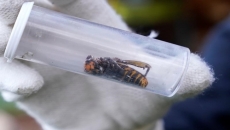British Columbia's children's representative says the COVID-19 pandemic has amplified inadequacies in mental health services as experts brace for rising rates of anxiety, depression and post-traumatic stress in children and young people.
"Going forward, we would be very wise to invest significantly more in mental health," given the pre-pandemic shortfalls and the benefits over time, said Jennifer Charlesworth in an interview.
Her office released a review Thursday of previous studies focused on kids' mental health after infectious disease outbreaks and natural disasters.
The review was led by Dr. Charlotte Waddell, the director of the children's health policy centre at Simon Fraser University.
Long-term studies and data are needed to assess exactly how the pandemic is affecting kids' development and mental health in B.C. and beyond, said Waddell, but she's concerned.
"The studies that we examined really strongly predict that we're going to see significant increases in the number of kids with anxiety, post-traumatic stress, depression and behaviour challenges," said Waddell, who's a specialist in child and adolescent psychiatry.
The Representative for Children and Youth receives hundreds of reports and calls from youth and advocates each month, said Charlesworth, and throughout the pandemic her office has noticed concerning trends related to mental health, substance use and family violence.
Both Waddell and Charlesworth emphasized that the pandemic is expected to have an inordinate effect on children living with pre-existing conditions and vulnerabilities, including those in foster care or in families that were already struggling with job loss and financial insecurity.
In their review, Waddell and her colleagues evaluated 60 articles published in the last 70 years, though they didn't find any studies on mental health related to COVID-19 and children because the pandemic is still unfolding.
One 2009 study focused on kids' mental health in parts of North America hit by outbreaks of avian influenza, the swine flu and severe acute respiratory system, or SARS.
It showed 20 per cent of 369 children surveyed had been isolated and 3.8 per cent had been quarantined. Of those children, 30 per cent exceeded the clinical threshold for post-traumatic stress symptoms, compared with 1.1 per cent of kids who did not isolate. When parents met or exceeded the same post-traumatic stress threshold, 85.7 per cent of their children did too, compared with 14.3 per cent of youngsters whose parents did not.
The good news, said Waddell, is that clinicians know how to effectively treat and prevent such challenges.
But children and their parents were already facing a stark shortfall in mental health supports before the pandemic and it now demands a massive scaling up, she said.
Waddell pointed to recent estimates that nearly 800,000 kids in Canada meet thresholds for a mental disorder needing treatment, but fewer than half are accessing support services.
Many people will need help as the pandemic runs its course, said Waddell, adding her plea is that children aren't forgotten among the competing demands for resources.
"If we don't address this, we are really talking about what will happen to our next generation of Canadian nurses and teachers and front-line workers of all types and we cannot turn away from this. We cannot afford not to address this, to really keep the kids in the foreground."
Dr. Ashley Miller, a psychiatrist at B.C. Children's Hospital, echoed Waddell, saying without long-term data it's tough to glean exactly how the pandemic and restrictions are affecting kids.
Anecdotally, she said, clinicians are seeing a range of experiences; the pandemic may not have significant adverse effects if young kids have nurturing relationships with their primary caregivers, while others are presenting with deepening anxiety, obsessive-compulsive disorder and eating disorders.
Miller said the nature and extent of restrictions limiting social interactions and other activities is also a factor.
"If parents are under substantial stress — financial stress, their own mental health issues, relationship issues and certainly domestic violence, then that can have a profound affect the development of young children who are growing up in the household."
The pandemic has also led to a drop in calls to child protection services, which Miller said is "concerning because we assume that there's more need but that the systems of care, whether it's schools or other programming where kids would be seen, they're not having as much access to right now."
Miller said many children are resilient but it's difficult to say how quickly they will transition back to "pre-COVID" ways of interacting with each other, like hugging or sharing food.
Some kids will adapt fairly quickly once they see how adults are behaving, she said, while others who had problems before the pandemic may be stuck in those patterns for longer.
"Is there more (obsessive-compulsive disorder) after the pandemic, because people have become so accustomed to avoiding touching surfaces?" asked Miller. "That's the kind of thing where we'll start looking for."






